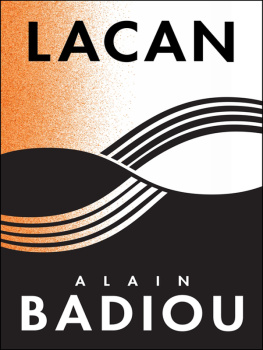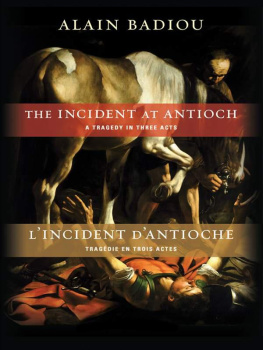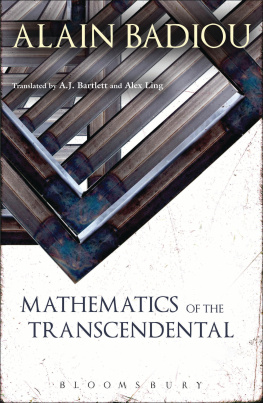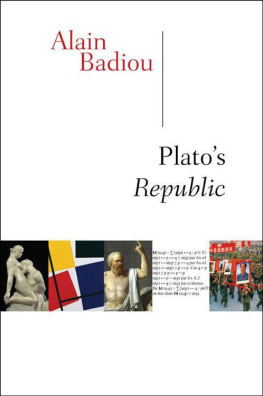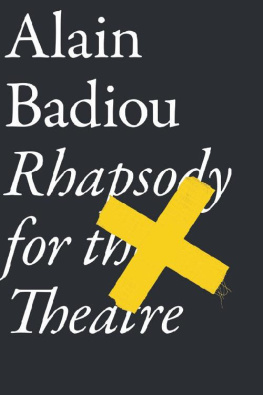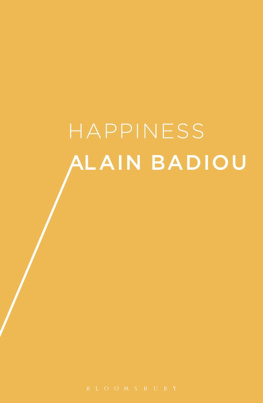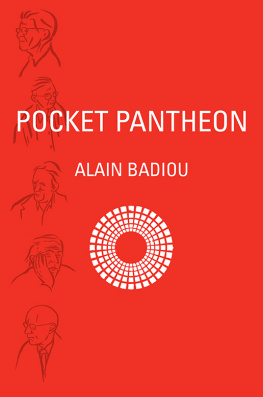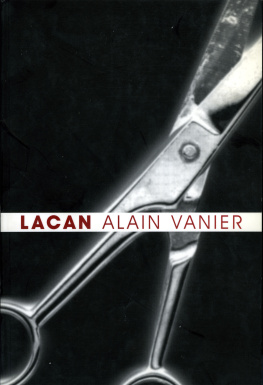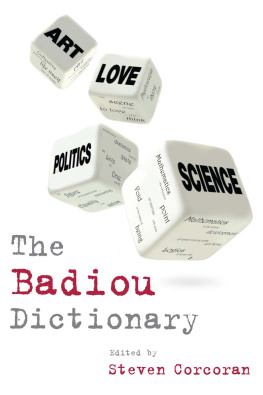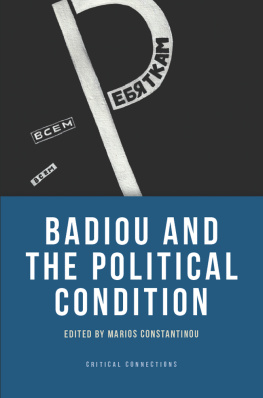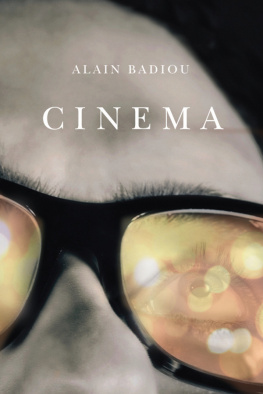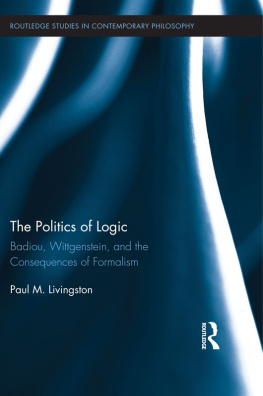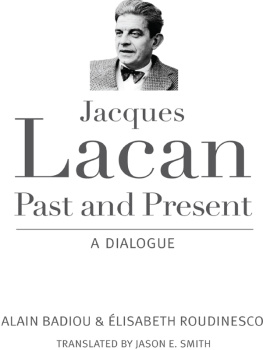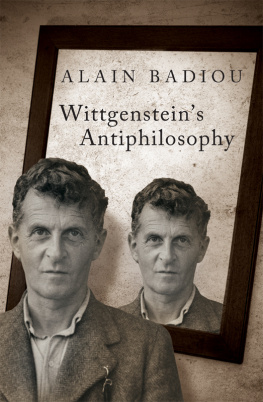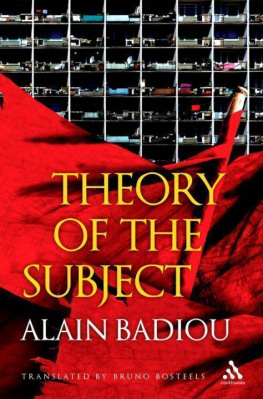Table of Contents
Lacan
The Seminars of Alain Badiou
The Seminars of Alain Badiou
Kenneth Reinhard, General Editor
Alain Badiou is widely considered to be one of the most important Continental philosophers of our time. Badiou has developed much of his thinking in his annual seminars, which he delivered in Paris from the late 1970s to 2017. These seminars include discussions that inform his major books, including Being and Event, Logics of Worlds, and The Immanence of Truths, as well as presentations of many ideas and topics that are not part of his published work. Some volumes of the seminar investigate individual thinkers and writers such as Parmenides, Plato, Nietzsche, Heidegger, Beckett, and Mallarm. Others examine concepts such as infinity, truth, the subject, the present, evil, love, and the nature of change. These seminars constitute an essential part of Badious thinking, one that remains largely unknown to the non-Francophone world. Their translation is a major event for philosophers and other scholars and students in the humanities and social sciences and for the artists, writers, political theorists, and engaged intellectuals for whom Badious work has rapidly become a generative and inspiring resource.
For a complete list of seminars, see .
Lacan
Anti-philosophy 3
Alain Badiou
Translated by
Kenneth Reinhard and Susan Spitzer
Introduction by Kenneth Reinhard
Columbia University Press
New York
Columbia University Press
Publishers Since 1893
New York Chichester, West Sussex
cup.columbia.edu
First published in French as Le SminaireLacan
2013 Librairie Arthme Fayard
English translation copyright 2018 Columbia University Press
All rights reserved
E-ISBN 978-0-231-54841-0
Library of Congress Cataloging-in-Publication Data
Names: Badiou, Alain, author.
Title: Lacan : anti-philosophy 3 / Alain Badiou; edited by Kenneth Reinhard and translated by Susan Spitzer.
Other titles: Seminaire-Lacan. English
Description: New York: Columbia University Press, 2018. | Includes bibliographical references and index.
Identifiers: LCCN 2018018868 (print) | LCCN 2018029840 (ebook) | ISBN 9780231548410 (ebook) | ISBN 9780231171489 (cloth : alk. paper)
Subjects: LCSH: Lacan, Jacques, 19011981. | Psychoanalysis.
Classification: LCC BF173 (ebook) | LCC BF173 .B148 2018 (print) | DDC 150.19/5092dc23
LC record available at https://lccn.loc.gov/2018018868
A Columbia University Press E-book.
CUP would be pleased to hear about your reading experience with this e-book at .
Cover design: Julia Kushnirsky
Contents
KENNETH REINHARD, SUSAN SPITZER, AND JASON E. SMITH
It is extraordinarily exciting to see the genesis of Badious ideas in the experimental and performative context of his seminars, and there is a great deal in the seminars that doesnt appear at all in his existing published writings.
The first volume of the seminars to be published in English, on Lacan, constitutes part of a four-year sequence on anti-philosophy that also includes volumes on Nietzsche, Wittgenstein, and Saint Paul. The second volume, on Malebranche, is part of a similar cluster on being, which also involves years dedicated to Parmenides and Heidegger. And the later volumes, beginning in 1996, gather material from multiple years of the seminars, as in the case of Axiomatic Theory of the Subject (which is based on the sessions from the years 199697 and 199798), and Images of the Present Time (which was delivered in sessions over three years, from 2001 to 2004).
Isabelle Vodoz and Vronique Pineau are establishing the French text of the seminar on the basis of audio recordings and notes, with the intention of remaining as close as possible to Badious delivery while eliminating unnecessary repetitions and other minor artifacts. In reviewing and approving the texts of the seminars (sometimes as long as thirty years after having delivered them), Badiou decided not to revise or reformulate them, but to let them speak for themselves, without the benefit of self-critical hindsight. Given this decision, it is remarkable to see how consistent his thinking has been over the years. Moreover, each volume of the seminars includes a preface by Badiou that offers an extremely valuable account of the political and intellectual context of the seminars, as well as a sort of retrospective reflection on the process of his thoughts emergence. In our translations of the seminars into English, we have tried to preserve the oral quality of the French edition in order to give the reader the impression of listening to the original recordings. We hope that the publication of Badious seminars will allow more readers to encounter the full scope of his ideas, and will allow those readers who are already familiar with his work to discover a new sense of its depths, its range, and its implicationsperhaps almost as if reading Badiou for the first time.
ALAIN BADIOU
The Seminars in English
It is a great pleasure for me to write this preface to the first volume of the English-language edition of the entire collection of thirty years of my seminars. It is hardly surprising that this project got its start in California, since it was there that my work and I were recognized early on in an English-speaking country, thanks in particular to Ken Reinhard, who has always had an original and profound insight into my work. I want to thank Columbia University Press for supporting what I know has been a long and difficult undertaking. And above all, I want to thank my friend Susan Spitzer, an incomparable translator who, for so many years, has been devoted to translating me, to transporting me from one language to another, with amazing creative zeal and accuracy, the fruit of her rich years in Paris. The information below is intended simply to shed some light on what these thirty years of public speaking have meant, to me and my various audiences, and why there may be some interest, or even pleasure, to be found in reading the seminars.
I. A Few Historical Reference Points
The word seminar should, in principle, refer to collective work around a particular problem. Instead, where these seminars are concerned, it refers to my own individual, albeit public, work on many different problems, all of which were nonetheless united by a philosophical apparatus explicitly claiming to be systematic.
Admittedly, the word seminar was already used in the latter sense with reference to Lacans famous seminar, which, for me and many other people, has raised the bar very high when it comes to this sort of thing.
That a large part of my teaching took the form of such a seminarwhose ongoing publication in French (ten volumes have come out so far), in English now, and in Spanish at almost the same time, will show that it remained virtually free from any institutional authoritywas originally due to pure chance.
At the beginning of the academic year 196667, while I was the senior class teacher at the boys high school in Reims, I was appointed lecturer in an establishment that had just been created and that testified to the rapid expansion of higher education in the supremely Gaullist France of those years: the Collge universitaire de Reims, affiliated with the University of Nancy. Initially, only so-called propaedeutic [i.e., college preparatory] teaching was to be provided there (at the time, there was a first year of studies with that name, validated by a final exam that, if successfully passed, allowed students to begin their first year of university). So I was asked to teach the philosophy option in this preparatory year. But all of a sudden, thanks to one of those nasty betrayals so typical of academic life, the University of Nancy announced that, for the time being, it couldnt relinquish its philosophical powers to Reims and that there wouldnt be any philosophy option for the preparatory program to which my position was attached.




